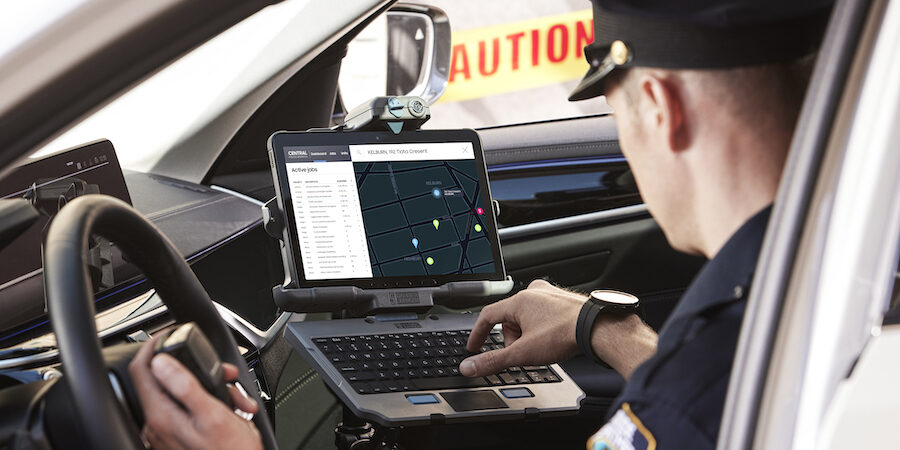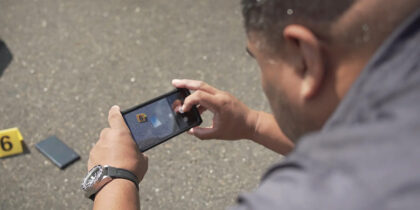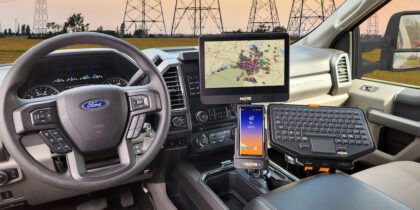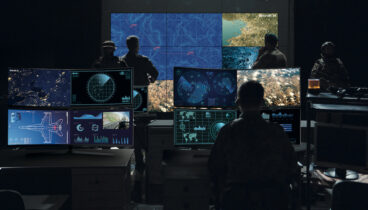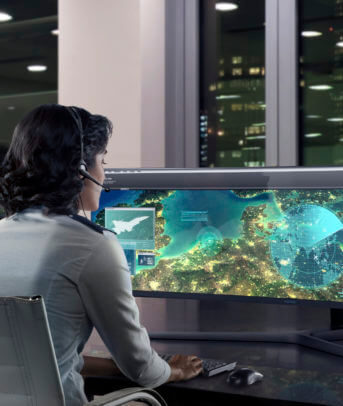Versatile field mobility for federal missions: one device for seamless connectivity wherever the mission leads
From homeland security to federal law enforcement to managing our national parks and delivering citizen services, a significant percentage of the federal workforce must be able to reliably communicate and work productively wherever the mission takes them. Many federal agents and workers spend significant time moving between their field assignments, their vehicles and their offices. Depending on their role, this typically requires them to juggle a combination of devices such as a smartphone, tablet, laptop, desktop computer, radio or rugged in-vehicle computer. But this is changing. To reduce costs, improve productivity and lean into supporting a truly mobile workforce, federal agencies are exploring whether the mobile device can serve as the primary computing device – providing users the combination of connectivity and functionality they need wherever they need it.
One mission, one mobile device
The rapidly increasing processing power of mobile devices, the availability of enhanced network connectivity such as 5G, and innovations across the mobile computing ecosystem are creating an opportunity to move toward a mobile-first infrastructure, where the mobile device is the primary computing device and eliminates the need for an additional laptop or PC. Samsung is at the forefront of this mobile device-PC convergence with DeX in Vehicle, which creates a PC-like experience anywhere you can connect to a monitor, keyboard and trackpad.
With Samsung DeX, mobile applications are not just cast to a larger display, but rather optimized for desktop use. DeX provides the same functionality users expect from a desktop experience, like multiple resizable windows, keyboard shortcuts and drag-and-drop editing without requiring any additional user configuration or specialized app versions. This enables seamless field-to-vehicle-to-office connectivity and an intuitive user experience.
Supporting a federal workforce wherever the mission takes them
While DeX can be used anywhere you have a monitor, Samsung DeX in Vehicle has rapidly gained popularity with police departments across the U.S., including the Chicago PD, Santa Barbara Police Department and Monroe County Sheriff’s Office (MCSO) in Missouri. Now, it is capturing the interest of many federal agencies with similar in-vehicle computing needs. SamsungDeX in Vehicle pairs select models of Galaxy smartphones or tablets with a mounted display and dedicated keyboard purposely designed for in-vehicle safety, reliability and comfort. The solution integrates with computer aided dispatch (CAD), situational awareness, records management, GPS and other productivity software to deliver a PC-like experience in a far more convenient form factor. DeX in Vehicle eliminates the need for additional expensive hardware, such as rugged tablets and bulky dedicated in-vehicle laptops, without sacrificing connectivity or functionality.
In the field
Galaxy smartphones are powerful investigative tools for federal officers in the field. For example, an officer can use their Galaxy smartphone to collect evidence by taking photos, recording an interview or capturing notes. If using a device compatible with Galaxy AI, productivity-enhancing artificial intelligence (AI) features make these tasks even easier. Transcribe assistance can record the interviews and automatically create written transcripts with conversation summaries. Interpreter can translate conversations in real time, helping ensure that language barriers do not create obstacles to time-sensitive investigative work.
In the vehicle
As valuable as the smartphone is on its own, that is only part of the value of DeX in Vehicle. When officers return to their vehicle, rather than sitting down and logging into a bulky laptop to type up a report while referencing the phone in their hand, they simply dock their device into DeX mode and continue their work. They can review the interview transcripts, add additional notes with the keyboard, and use Galaxy AI features like Note Assist to help finalize the report for sharing or filing. Officers can review and analyze collected images, evidence and video links on the larger screen and share with inter-agency taskforces and investigative teams.
In the office
When they return to the office, they can dock their smartphone with a desktop monitor and keyboard and input any additional information needed to complete the report or continue their evidence analysis. This entire experience is absolutely seamless to the officer, even more so than docking a phone into a traditional PC or laptop, because DeX mode does not ask them to move between mobile and desktop app versions. Rather, the apps and data they work with on the phone are the same when docked in DeX mode, but with the advantages of a full-size keyboard, the real estate of a monitor, and the precision of a trackpad.
Designed for demanding, high-security environments
Samsung Galaxy devices are particularly well-suited for mobile fieldwork. They offer office-friendly features, such as Galaxy AI and Microsoft integration, as well as rugged options for more demanding environments or specialized operator requirements. In fact, Samsung’s complete portfolio of rugged devices, widely recognized as the mobile technology of choice for situational awareness in field operations, is optimized for Samsung DeX. Additional features like Push-to-Talk, Mission Critical Push-To-Talk, and programmable side buttons support operators across a wide variety of mission areas.
Further, Galaxy devices are built with the critical security protection and management capabilities of Samsung Knox, a defense-grade, hardware-backed enterprise mobile security platform. Private and sensitive data remains protected and compliant with both Criminal Justice Information Services (CJIS) and Health Insurance Portability and Accountability Act (HIPAA) requirements. Many Galaxy AI features are also compatible with high-security environments since they are processed directly on the device and do not require cloud access. In fact, Knox Manage can control AI features to meet CJIS compliance requirements. If using a virtual desktop infrastructure (VDI), DeX comes VDI-ready1 to enable seamless and secure remote access to virtual desktops, files, and applications. Multi-factor authentication, including biometrics, can also be used to ensure even higher levels of security.
More versatility, stronger durability, lower costs
In addition to federal law enforcement, agencies operating across a broad spectrum of homeland security and distributed missions, including large-scale emergency response, disaster recovery, federal fire services, and border patrol, all have a pressing need for a more productive in-vehicle computing experience to support operators and drive situational awareness. DeX in Vehicle delivers on that need at a lower cost. With fewer devices to purchase, manage and maintain, a DeX-enabled mobile infrastructure offers the flexibility and security that federal agencies need. Samsung and its federal solutions partners can deliver an end-to-end mobile ecosystem of readily available, commercial-off-the-shelf devices backed by defense-grade security from Samsung Knox. One analysis estimated that a transition to the DeX mobile infrastructure could result in a 20% reduction in costs when aggregated over a three-year lifecycle.
Smartphones have become increasingly powerful productivity tools. DeX in Vehicle extends those capabilities to provide a versatile, durable and efficient in-vehicle computing experience. Learn more about how DeX in Vehicle can help your agency.
1Compatible with VDI clients from Microsoft, Adobe, AWS and Citrix in DeX in-Vehicle solution kit
